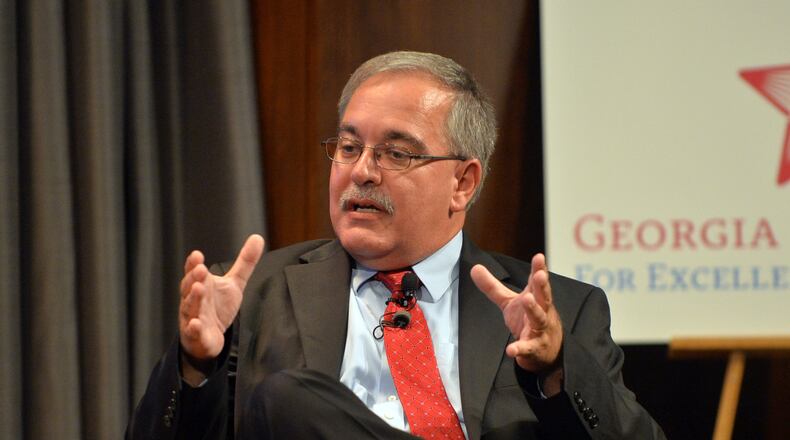Gov. Nathan Deal refused to sign Georgia’s plan for complying with the latest federal education law, highlighting a conflict with state school Superintendent Richard Woods.
Deal wrote to Woods that Georgia’s plan, required under the Every Student Succeeds Act, “falls short in setting high expectations for Georgia students and schools” and is too restrictive on how local districts run their schools.
One Georgia Board of Education member said the conflict between Deal and Woods is a terrible sign for the state’s public schools. “Ignoring the input of our governor to the ESSA plan to the point where he did not sign it is not how one moves education forward,” said board member Larry Winter, from North Georgia.
At Thursday’s board meeting, Winter had strong criticism for Woods’ leadership of Georgia’s education department.
Woods sent the plan to U.S. Education Secretary Betsy DeVos on Sept. 18, the same day as Deal’s letter.
It’s unclear what recourse Deal has, but he promised to pull one lever within reach: Deal explained in his letter to Woods that he was refusing to sign the plan because he disagreed with it, and added, “I will communicate as much to Secretary DeVos.”
The intrastate and intraparty tiff is a potato served hot to DeVos. Deal and Woods are Republicans, and DeVos serves a Republican president. Congress said the education secretary had to approve any state plan that followed the law. So far she has been approving plans with minimal pushback.
Consternation over Georgia’s plan spilled into the open Thursday at the Georgia Board of Education’s monthly meeting with Woods.
“Communication between the board and the department is at an all-time low,” declared Winter. He was referring to the Georgia Department of Education led by Woods. Winter said it was easier to reach the governor than to get an email returned by Woods’ senior staff, and he complained that neither Deal nor the board got enough input into the plan.
Deal’s office did not immediately respond to a request for comment.
Woods said the plan was crafted with the input of thousands of Georgians, including the governor. “Everybody had an equal voice,” he said.
But Winter said the governor’s voice should be considered as “a little bit louder.”
In a back-and-forth of letters earlier this month, Woods rejected several of Deal's recommended changes, saying they would have increased the weight of test results on the state report card for schools, the College and Career Ready Performance Index, or CCRPI. In adopting ESSA, members of both parties in Congress acknowledged that the regime of testing under the prior No Child Left Behind Act had gone too far.
Woods’ chief of staff, Matt Jones, told the school board the public felt that way, too. “We heard loud and clear from Georgians that they want a broader measurement of school quality than just high-stakes testing,” he said.
Woods’ plan de-emphasized testing by rewarding schools for things like reduced student absenteeism or increased participation in Advanced Placement courses. Woods said in a letter to deal that putting more weight on tests would have returned Georgia to a culture of “measure, pressure, and punish,” something Deal denied in his Sept. 18 letter. Deal preferred a simpler test-based accountability measure while giving schools greater freedom under their “flexibility” contracts. All but two of the state’s 180 school districts have signed such contracts, which hold them accountable to measures such as the CCRPI.
Woods, who like Deal is elected by voters, has disagreed with the governor in the past, most visibly over the design of the state's new turnaround plan for low-performing schools. Woods wanted to be in charge of it but lawmakers this year put the school board, which the governor appoints, in the driver's seat.
It's unclear how much influence Deal has over the state's ESSA plan. Federal law merely requires that governors get 30 days to review and comment before submission. It says plans can be submitted without a governor's signature, but doesn't state the consequences.
A memo circulated to governors by the National Governors Association in April suggests that governors have no recourse but public opinion. Among the actions it recommends for governors who refuse to sign: Send a letter to the U.S. education secretary explaining why, and issue a press release.
The Every Student Succeeds Act of 2015 reauthorized the federal education law, which was previously known as No Child Left Behind.
ESSA still requires tests, but leaves more decisions about school accountability to states.
State education leaders like Georgia Superintendent Richard Woods are in charge of their plans, though governors can review and comment on the plans.
About the Author
Keep Reading
The Latest
Featured


